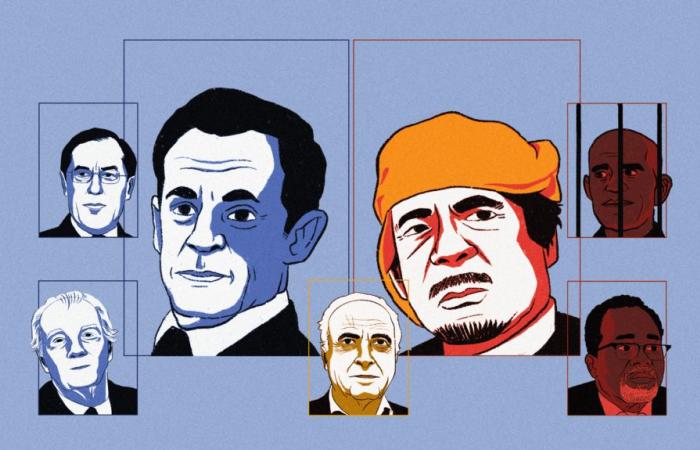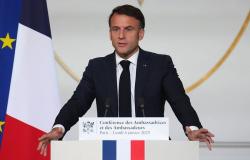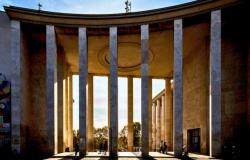A former head of state who proclaims his innocence, sulphurous intermediaries, missing key witnesses, a dead dictator… The trial on suspicion of Libyan financing of Nicolas Sarkozy's presidential campaign in 2007 opens Monday January 6 before the Paris criminal court. The former tenant of the Elysée and three of his former ministers find themselves on the dock. They are suspected of having sealed and set up “a pact of corruption” with the Libyan tyrant Muammar Gaddafi.
In total, 13 defendants are referred to justice, mainly for active and passive corruption, illegal financing of electoral campaigns and criminal association. Most of them face ten years in prison, as well as a ban on civil rights and holding public office. While four personalities will be missing, the shadow of certain actors in the case, dead, will hang over the trial which is expected to last three months. Here are the protagonists of this state affair with complex ramifications.
Nicolas Sarkozy and Libyan dictator Muammar Gaddafi
Contesting all the accusations from the start, Nicolas Sarkozy, 69, is on trial for passive corruption, illegal financing of an electoral campaign, criminal conspiracy and concealment of embezzlement of Libyan public funds. The investigating judges, who signed the order of referral to the criminal court consulted by franceinfo, accuse him of having “knotted”with dictator Muammar Gaddafi “a pact of corruption” for financing his victorious presidential campaign in 2007, during a visit to Tripoli on October 6, 2005 as Minister of the Interior.
For the judges, the Libyan supreme guide, customary of handing over“pocket money” to foreign political decision-makers according to interviewed witnesses, granted this financial aid – 50 million euros promised to Nicolas Sarkozy, according to an official Libyan document published by Mediapart in 2012 – in exchange for “counterparties”diplomatic, economic and judicial. After his visit to Paris with great fanfare at the end of 2007, the dictator was once again ostracized by the international community. On March 10, 2011, while the Libyan revolution was rumbling, driven by the Arab Spring, the Elysée recognized the Libyan National Transitional Council. Muammar Gaddafi then his son then claimed to have “given” money to the French President of the Republic “so he can win the elections at home”.
On March 17, 2011, the UN Security Council adopted Resolution 1973, initiated by France, authorizing the use of force to protect civilian populations in Libya. Seven months later, on October 20, Muammar Gaddafi died after being lynched by the crowd.
Three ministers and a Sarkozie collaborator
Nicolas Sarkozy is suspected of having allowed “perfect knowledge of the facts”his relatives for recovery of the money. Prominent among his lieutenants is Claude Guéant, 79 years old. Successively chief of staff then campaign director of Nicolas Sarkozy, secretary general of the Elysée and minister of the Interior, he made several visits to Libya and, according to the judges, “organized fund transfers” between the two countries, notably via the Franco-Lebanese intermediary Ziad Takieddine.
Claude Guéant is also suspected of having personally enriched himself. He justified the origin of a transfer of 500,000 euros, in February 2008, by the sale of two Flemish paintings from Andries Van Artvelt to a Malaysian business lawyer. But experts estimated their value to be between 40,000 and 50,000 euros. The judges describe a complex financial arrangement intended to disguise the “fictitious sale” of these works. In this sub-part of the case, four people are referred to justice: the Saudi billionaire Khaled Ali Bugshan, targeted by an arrest warrant, his cousin Ahmed Bugshan, the Franco-Djiboutian banker Wahib Nacer and the official buyer paintings, Sivajothi Rajendram, whose death the French justice system recently learned. The termination of the proceedings against him should be made official at the opening of the trial.
Another member of the Sarkozie referred to justice, Brice Hortefeux, 66, is suspected of having also acted as an intermediary, through Ziad Takieddine's network. At the time Minister Delegate for Local Authorities and Treasurer of the Association in Support of Nicolas Sarkozy's Action, he met twice in Libya with Abdallah Senoussi, head of military intelligence and brother-in-law of Muammar Gaddafi. Incriminating element concerning him: a bank identity statement, which he is suspected of having provided in November 2006 to the Libyan authorities for the transfer of funds.
Regarding Eric Woerth, 68 years old, former treasurer of the 2007 campaign, he participated, according to the judges, in the illegal financing system by circulating cash within the UMP candidate's team . In his defense, the former Minister of Labor and Budget under Nicolas Sarkozy claimed that these bonuses – around 200,000 euros, according to court estimates – came from anonymous donations. A version contradicted by witnesses.
Former collaborator of Nicolas Sarkozy at the Neuilly town hall and at the Ministry of the Budget, Thierry Gaubert, 74, is suspected of having received 440,000 euros in his account in the Bahamas at the beginning of 2006 via a Ziad Takieddine company. This account had previously been credited with a transfer from the Libyan public treasury, the judges point out. Thierry Gaubert and the Franco-Lebanese businessman were both convicted at first instance in June 2020 – they will know their fate on appeal on January 21 – in the financial aspect of the Karachi affair, relating to the payment of illegal kickbacks in the context of Edouard Balladur's presidential campaign in 1995.
Three former dignitaries of the Libyan regime
They will be conspicuous by their absence. Three senior dignitaries of the Libyan regime are considered protagonists in this affair but only one is referred to French justice: Bachir Saleh, 78 years old. Targeted by an arrest warrant, the former chief of staff of Muammar Gaddafi must be tried in absentia. According to the judges, “judicial information highlighted the central role” of this financier of the Libyan regime. He met “on several occasions Claude Guéant” “during the campaign” from 2007 and “knew the exact amounts paid to the French”estimate the magistrates.
According to them, this close to the intermediary Franco-Algerian Alexandre Djouhri was exfiltrated by the French Ministry of the Interior at the time of the fall of the regime in 2011. After a few months spent in France, Bachir Saleh was sent to Niger, then to South Africa, where he escaped an assassination attempt in early 2018. He had previously supported in the press the assertions of Moummar Gaddafi on the financing of Nicolas Sarkozy's campaign.
The other key figure in the file on the Libyan side is Abdallah Senoussi, 76 years old. For the prosecution, the former head of military intelligence is one of the architects of “corruption pact” and benefited from compensation. However, he is not being prosecuted in this case. He is currently detained in Tripoli, where he faces trial for war crimes. Targeted by an arrest warrant in France after his conviction for his role in the attack on the UTA DC-10, which left 170 dead, including 54 French, in 1989, he negotiated the promise of an amnesty and met at least twice, according to the judges, Claude Guéant and Brice Hortefeux. Of the “transfers” were then “performed”on his “instructions”.
Found drowned in the Danube, in Vienna (Austria), on April 29, 2012, the former Libyan Oil Minister Choukri Ghanem can no longer testify but his notebooks will speak for him. Seized in 2015 by French justice, they mention, on April 29, 2007, three payments intended for Nicolas Sarkozy, for at least 6.5 million euros. “I don't know if they really believe that they can change France's policy with this money. First of all, the amounts they are committing are derisory on a European scale. And other countries are paying much more”he wrote then. The Austrian police, who investigated his death, concluded that it was an accident, but his relatives do not believe it.
Ziad Takieddine and Alexandre Djouhri, shadow intermediaries
They are sworn enemies and their life is worthy of a dark novel. Close to the French right, the Franco-Lebanese Ziad Takieddine, 74, and the Franco-Algerian Alexandre Djouhri, 66, are the two main unofficial intermediaries in fund transfers.
The first is the man who brought the scandal to light. During interrogation on December 19, 2012 as part of the financial aspect of the Karachi affair – in which he was sentenced in mid-2020 to five years in prison – Ziad Takieddine discusses the financing of Nicolas Sarkozy's campaign to the tune of 50 million euros by Colonel Gaddafi's regime. According to this businessman close to the balladurian circles, the payments through him began at the end of 2006 and reached five million million euros at the beginning of 2007. His main interlocutors, he assures, were Claude Guéant and Abdallah Senoussi.
But at the end of 2020, there was a twist: from Beirut, the septuagenarian withdrew. A case within a case, which led to Nicolas Sarkozy, his wife, Carla, and Mimi Marchand, popess of the celebrity press, being indicted for witness tampering or concealment of the same offense. Ziad Takieddine finally returned to his initial testimony, claiming to have been offered “millions of euros” in exchange for this aborted rescue operation by Nicolas Sarkozy. Subject to an arrest warrant, he must be tried in his absence.
Alexandre Djouhri should take his place on the dock. Coming from the ranks of chiraquia, this former delinquent from Val-d'Oise who became a powerful businessman, close to the Françafrique networks, is suspected of having benefited from embezzled Libyan public funds, but not for the benefit of the campaign by Nicolas Sarkozy. Alexandre Djouhri's network, through the Libyan financier Bachir Saleh and its sovereign fund, the Libya Africa Investment Portfolio, acquired after the presidential election, according to investigations, a villa in Mougins (Alpes-Maritimes) at an overvalued price in order to hide possible hidden payments. The Franco-Djiboutian banker Wahib Nacer, implicated in the paintings section, is also suspected of having worked in this sale.
According to the judges, Alexandre Djouhri also established himself as an intermediary in the sale of 12 Airbus to the Libyan airline Afriqiyah Airways in 2006, and received, at a minimum, 2 million euros in kickbacks, on the instructions of Edouard Ullmo, a 61-year-old former Airbus executive who is appearing for these facts. With the help of the former head of domestic intelligence, Bernard Squarcini, he is also accused of having played a role in the exfiltration of Bachir Saleh, threatening him with dead if he spoke to the French judicial authorities, according to the Libyan's claims.






